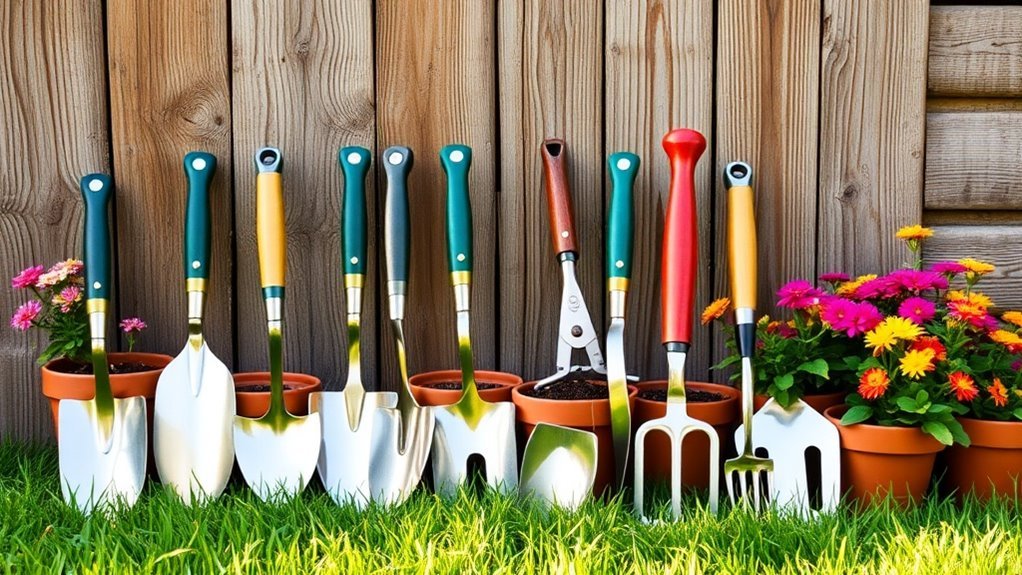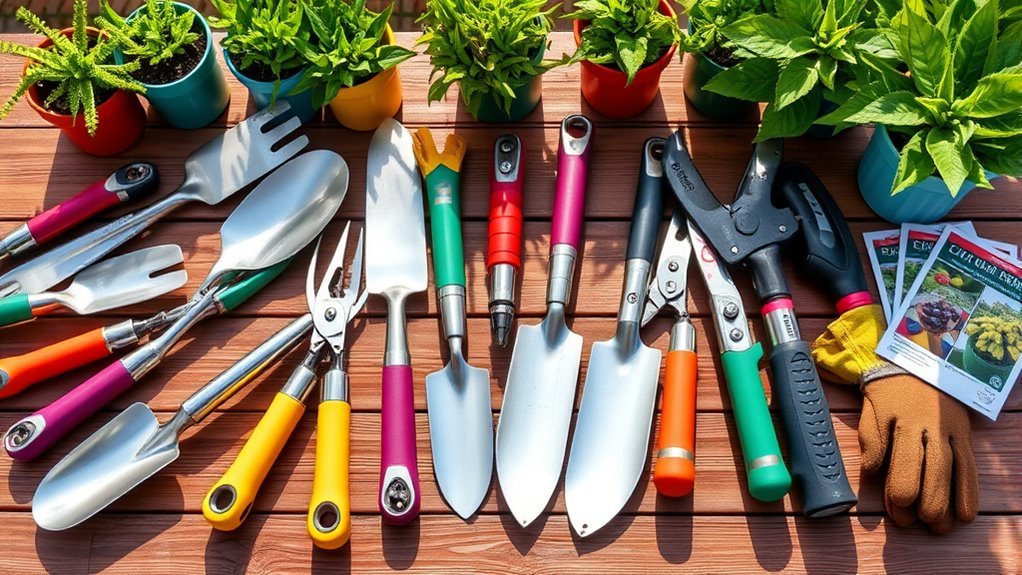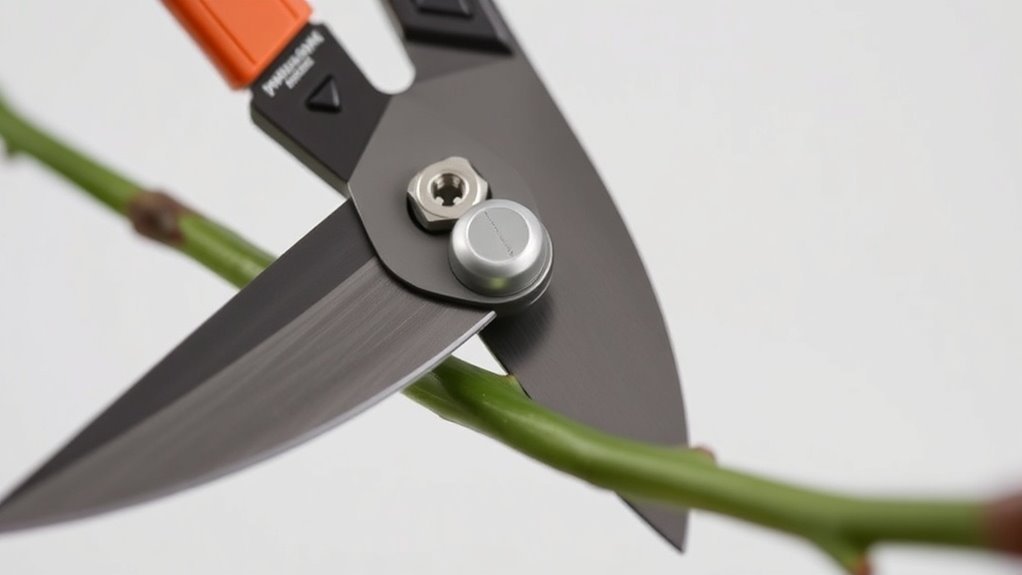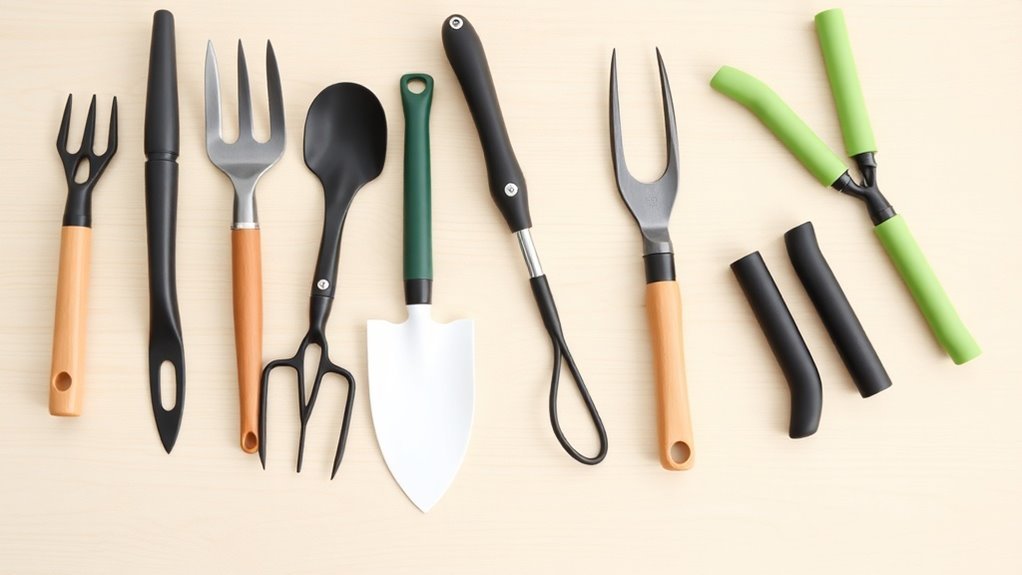Hose Materials Explained: Rubber vs. Vinyl vs. Hybrid
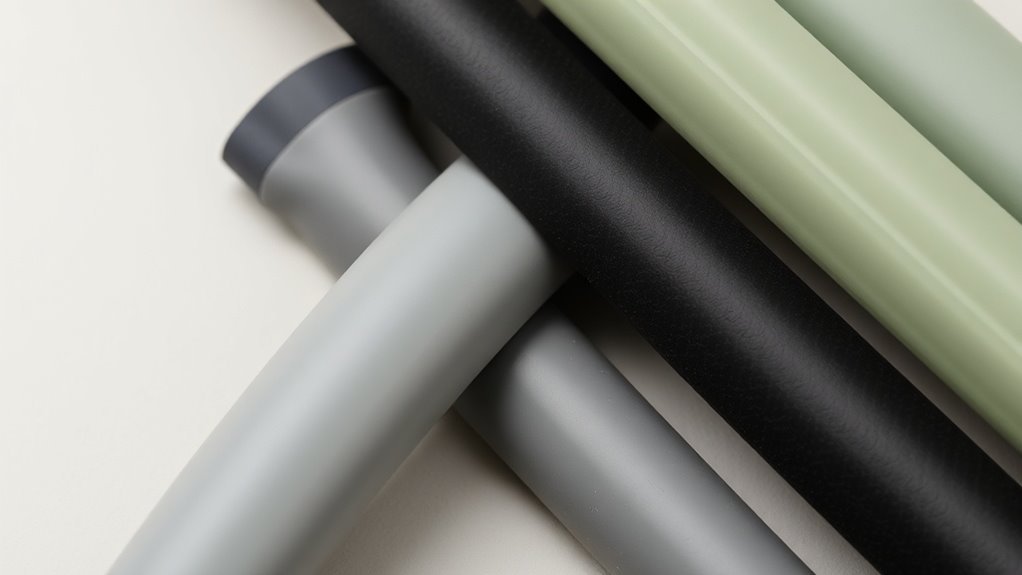
When choosing a hose, it’s essential to know the differences between rubber, vinyl, and hybrid materials. Rubber hoses offer great durability and flexibility but can be heavier and pricier. Vinyl hoses are lightweight and budget-friendly, but they show signs of wear more quickly. Hybrid hoses combine the strengths of both, providing durability without the weight. Each type has its strengths depending on your needs. If you keep exploring, you’ll discover more tips on selecting the best hose for your tasks.
Key Takeaways
- Rubber hoses offer exceptional durability, flexibility, and temperature resistance, making them ideal for demanding applications.
- Vinyl hoses are lightweight and budget-friendly but lack durability, leading to potential issues like kinking and cracking.
- Hybrid hoses combine the best features of rubber and vinyl, providing impressive flexibility, durability, and temperature resistance for versatile applications.
- When choosing a hose, consider the specific application, required length, flexibility, and temperature rating to ensure optimal performance.
- Hybrid hoses are particularly beneficial for users needing a lightweight option with robust performance across various conditions and uses.
Overview of Hose Materials
When choosing the right hose material for your needs, understanding the options available is essential. Hoses come in various materials, each tailored for specific applications.
Vinyl hoses are lightweight and flexible, making them easy to maneuver and ideal for light-duty tasks. They resist kinks, but their durability may be limited compared to other materials.
Rubber hoses, known for their strength, provide excellent performance in tougher conditions and are often resistant to temperature fluctuations and abrasives.
Hybrid hoses combine the benefits of both vinyl and rubber, offering flexibility and durability for a wide range of tasks.
Characteristics of Rubber Hoses
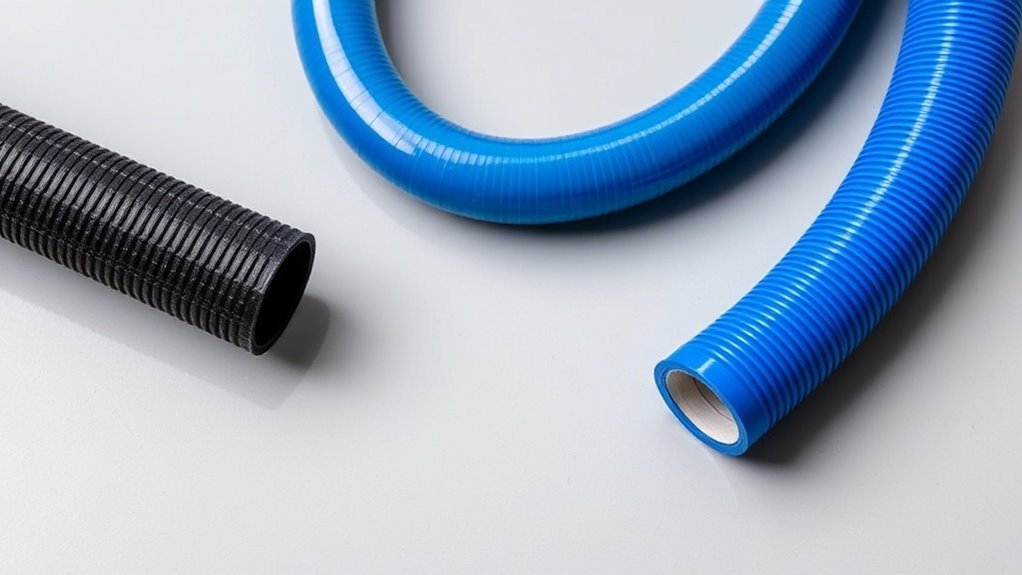
Rubber hoses are often favored for their impressive strength and durability, capable of handling demanding tasks without failure. They offer several key characteristics that make them a reliable choice for various applications:
- Flexibility: Rubber hoses remain flexible in various temperatures, making them suitable for both hot and cold environments.
- Abrasion Resistance: They can withstand rough surfaces, reducing wear and tear over time.
- Chemical Resistance: Rubber can tolerate a wide range of chemicals, making them ideal for industrial use.
- Pressure Handling: These hoses maintain structural integrity under high pressure, which is vital for many tasks.
With these features, you’ll find rubber hoses aren’t only practical but essential in many settings.
Advantages of Rubber Hoses
One of the standout benefits of rubber hoses is their versatility across a wide range of applications.
Whether you’re using them for gardening, industrial work, or automotive needs, rubber hoses can handle it all. They’re known for their durability, resisting wear, and potential damage from heat, chemicals, and UV rays. You can count on them to maintain their performance even in extreme conditions, which adds to their reliability.
Additionally, rubber hoses provide superior flexibility, making them easier to maneuver in tight spaces. They also maintain their shape, preventing kinks and ensuring a consistent flow.
With a rubber hose, you’ll experience enhanced longevity, making it a valuable investment whether for home use or commercial tasks.
Disadvantages of Rubber Hoses
While rubber hoses offer many benefits, there are some downsides you should consider.
They can be heavier and less portable compared to other options, making them harder to maneuver.
Additionally, you’ll often find that their price tag is higher, which mightn’t fit every budget.
Weight and Portability Issues
Though rubber hoses are known for their durability and flexibility, they can pose significant weight and portability issues. When you’re lugging around a heavy hose, it can become quite cumbersome, especially during long tasks.
Here are a few things to take into account:
- Weight: Rubber hoses are generally heavier than vinyl or hybrid options, making them hard to maneuver.
- Storage: Their bulk can make storage a hassle, requiring more space in your garage or shed.
- Transporting: Taking a rubber hose to a job site or while traveling can be tiring due to its weight.
- Fatigue: Prolonged use can lead to physical fatigue, as the heavy material adds strain to your body.
Higher Cost Factor
When it comes to choosing a garden hose, the higher cost of rubber hoses can be a major drawback. While rubber hoses offer durability and flexibility, their price tag often deters homeowners on a budget.
You might find that quality vinyl or hybrid options serve your needs at a fraction of the cost, making them more appealing for casual gardening tasks. This can result in a tougher decision if you’re balancing long-term investment versus initial expense.
Characteristics of Vinyl Hoses
Vinyl hoses are known for their versatility and ease of use, making them a popular choice for various applications. They come with several characteristics that set them apart:
- Lightweight: You can easily maneuver vinyl hoses, reducing fatigue during use.
- Flexible: Their flexibility allows for versatility in tight spaces or around obstacles.
- Weather-resistant: Vinyl hoses resist UV rays and weather conditions, making them suitable for outdoor use.
- Cost-effective: Compared to other hoses, vinyl options typically have a lower initial cost.
These qualities make vinyl hoses a practical choice for gardening, watering, and other household tasks.
Understanding these characteristics can help you make a more informed decision on which hose suits your particular needs.
Advantages of Vinyl Hoses
While many hose materials exist, the advantages of vinyl hoses make them an appealing option for homeowners and gardeners alike.
One of the key benefits is their lightweight nature, making them easy to maneuver and store. Vinyl hoses are also resistant to abrasion, which helps them maintain their integrity over time. They’re often UV-resistant too, meaning they won’t easily degrade under sunlight.
Additionally, they’re available in a variety of colors and lengths to suit your specific needs, adding a touch of personalization. Vinyl hoses generally offer flexibility, which allows for easier handling during use.
Plus, they’re usually more affordable than other materials, making them a budget-friendly choice for various gardening tasks.
Disadvantages of Vinyl Hoses
While vinyl hoses have their perks, they also come with some notable drawbacks.
You might find that their durability isn’t always up to par, especially when exposed to harsh conditions.
Additionally, temperature sensitivity can limit their effectiveness in extreme weather, making it essential to know their limitations.
Durability Concerns
Although vinyl hoses are popular for their lightweight and flexibility, they do have notable durability concerns.
When you’re choosing a hose, it’s essential to understand these limitations:
- Wear and Tear: Vinyl can wear out faster than other materials, especially with frequent use.
- Kinking: Vinyl hoses are prone to kinking, which can disrupt flow and cause damage.
- Cracking: Over time, exposure to UV light and varying conditions can lead to cracks in the material.
- Chemical Sensitivity: Certain chemicals can degrade vinyl more quickly, affecting its lifespan.
While vinyl might seem appealing initially, considering these durability issues will help you make a more informed decision for your needs.
Temperature Sensitivity
When you reflect on using vinyl hoses, be aware that they have significant temperature sensitivity issues that can affect performance. These hoses can become brittle in cold weather and may kink or soften excessively in heat, leading to leaks or breaks.
Here’s a brief comparison of temperature effects:
| Temperature Condition | Impact on Vinyl Hoses |
|---|---|
| Below 32°F (0°C) | Becomes brittle and cracks |
| Room Temperature | Flexible but may degrade over time |
| Above 100°F (38°C) | Softens, prone to kinking |
| Continuous Sunlight | UV damage, deteriorates quickly |
| Freezing Conditions | Risk of rupturing |
While vinyl hoses can be inexpensive, their temperature sensitivity is a serious concern during use. Make sure to evaluate these factors before purchasing.
Characteristics of Hybrid Hoses
Hybrid hoses embody versatility and innovation, combining various materials to create a product that meets diverse application needs.
When you choose a hybrid hose, here are some characteristics you can expect:
- Flexible Design: They offer excellent maneuverability, making them easy to handle in tight spaces.
- Durability: Hybrid hoses are built to resist wear and tear, prolonging their lifespan compared to standard hoses.
- Temperature Range: They maintain performance in a broad temperature spectrum, adapting to different environment conditions.
- Lightweight: Lighter than traditional rubber hoses, making it easier for you to carry and use them for extended periods.
With these outstanding features, hybrid hoses are designed to meet a wide range of applications effectively.
Advantages of Hybrid Hoses
When considering hybrid hoses, you’ll quickly notice their impressive durability and flexibility, making them easy to handle in various situations.
They also excel in temperature resistance, ensuring reliable performance in extreme conditions.
Plus, their versatility means you can use them across a wide range of applications, enhancing your efficiency.
Durability and Flexibility
Though many hose materials exist, you’ll find that hybrid hoses offer an impressive balance of durability and flexibility. They’re designed to withstand various conditions while maintaining their shape and functionality.
Here are a few reasons why hybrid hoses stand out:
- Resilience: They resist kinks and abrasions, which makes them perfect for heavy-duty tasks.
- Lightweight: Unlike rubber hoses, hybrid hoses are lighter, making them easier to maneuver.
- Easy Storage: Their flexible design allows for compact storage without damaging the hose.
- Versatile Use: Whether you’re watering the garden or washing your car, hybrid hoses are ideal for multiple applications.
With these advantages, hybrid hoses provide the ultimate combination for any hose enthusiast.
Temperature Resistance
Unlike many traditional hoses, hybrid hoses excel in temperature resistance, making them a smart choice for various climates.
These hoses can handle extreme heat and cold without compromising their integrity, allowing you to use them year-round. They’re typically constructed using a unique blend of materials that provide flexibility while resisting cracking or becoming brittle in low temperatures.
You won’t have to worry about your hose sagging, leaking, or bursting due to temperature fluctuations. This reliability means you can tackle outdoor tasks in any season with confidence.
Versatile Applications
Thanks to their impressive temperature resistance, hybrid hoses are perfect for a wide range of applications, making them highly versatile. You’ll find these hoses useful in various scenarios, offering great performance under different conditions.
Here are some of their top applications:
- Gardening: Ideal for watering plants and lawn care, thanks to flexibility and durability.
- Industrial Use: Excellent for transferring air, water, and chemicals in factories.
- Automotive: Perfect for coolant lines and fuel delivery systems.
- Construction: Reliable for powering tools and handling various material transport.
With hybrid hoses, you get a practical solution that enhances efficiency, making them a go-to choice for both casual and professional users.
Choosing the Right Hose for Your Needs
How do you choose the right hose for your specific needs?
First, consider what you’ll be using it for. If you’re watering your garden, a rubber hose might be best due to its durability. For lighter tasks, like filling a pool, a vinyl hose could be sufficient.
Think about the length and flexibility too; you don’t want to struggle with a hose that’s too stiff. Also, check the temperature rating – certain hoses can’t handle extreme heat or cold.
If you’re looking for versatility, consider a hybrid hose, which combines the best of both rubber and vinyl.
Finally, be mindful of storage; a lightweight hose can save space and hassle. Choose wisely to guarantee you get the most out of your investment.
Questions
Can I Use All Hose Types for Drinking Water?
Not all hose types are safe for drinking water. You should look for hoses specifically labeled as drinking water safe, usually made from materials approved for potable water. Always check the label before using.
How Do I Store Hoses to Prolong Their Lifespan?
If you store hoses properly, you can extend their lifespan by up to 50%! Always coil them neatly, keep them out of direct sunlight, and avoid kinks. A little care goes a long way!
What Are the Environmental Impacts of Hose Materials?
Hose materials can considerably impact the environment. Rubber’s biodegradable qualities are beneficial, while vinyl contributes to plastic pollution. Hybrid hoses offer a balance, but always consider recycling options to minimize your ecological footprint.
Are Rubber Hoses Safe for High-Pressure Applications?
Rubber hoses can handle pressures up to 300 PSI, making them safe for most high-pressure applications. Their durability and flexibility guarantee reliability, so you can trust them for demanding tasks without compromising performance.
How Can I Repair a Damaged Hose?
To repair a damaged hose, start by cutting out the damaged section. Use a hose mender or clamps to reconnect the ends securely. Always check for leaks after making the repair before using it again.
Conclusion
When it comes to choosing the right hose material, it really boils down to your specific needs. Did you know that rubber hoses can last up to three times longer than vinyl ones when properly cared for? While rubber offers durability and flexibility, vinyl may be more affordable but can struggle in extreme conditions. Hybrid hoses combine the best of both worlds, giving you options that suit various tasks. So weigh your choices carefully to find the perfect fit for your projects!

